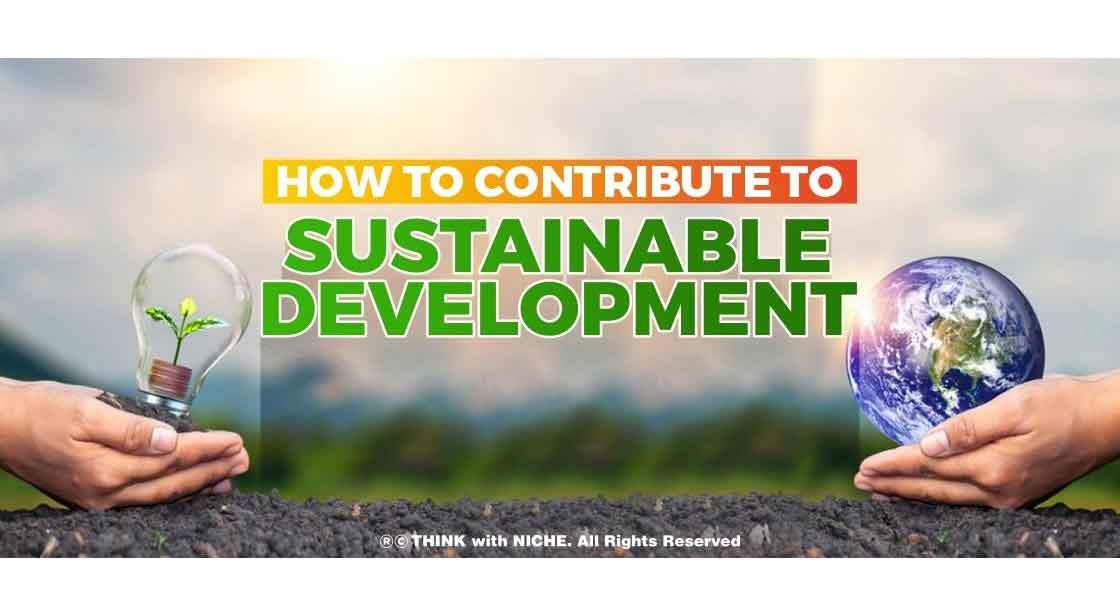How To Contribute To Sustainable Development

Blog Post
The Importance of Sustainable Development can't be overstated! ThinkWithNiche writes about how to contribute successfully and effectively towards Sustainable Development, especially at workplaces. Many of the world's development difficulties are particularly acute for young people. Young people are vital to future economic development and the achievement of the Sustainable Development Goals (SDGs), also known as the Global Goals. Everyone gains when young people have access to decent, productive work, and the future looks brighter. #TWN
The Brundtland Report, which warned of the negative environmental consequences of economic growth and globalization and attempted to find possible solutions to the problems caused by industrialization and population growth, introduced the concept of sustainable development in 1987, addressing the importance of sustainable development. The SDGs are a worldwide plan of action that will be implemented in 2030 to eradicate poverty in all of its forms and promote sustainable development in all of its three dimensions - economic, social, and environmental. Many of humanity's problems, such as climate change, water shortages, inequality, and hunger, can only be tackled on a global scale and via the promotion of sustainable development, which includes a dedication to social advancement, environmental balance, and economic prosperity. The United Nations approved the 2030 Agenda, which includes the Sustainable Development Goals, a call to action to safeguard the planet and ensure the global well-being of people, as part of a new sustainable development roadmap. Individuals, corporations, governments, and countries all across the world must work together to achieve these common goals.
The Importance of Sustainable Development!
Businesses might be among the worst offenders when it comes to water waste, therefore when they take the lead in water conservation, they can have a major impact on community understanding. Support SDG 6 - Clean Water and Sanitation by signing a WASH (water, sanitation, and hygiene) pledge to "[implement] safe water, sanitation, and hygiene in the workplace." It will not only assist to keep your neighborhood clean, but it will also set a standard for everyone to follow, even your competition! If you have the ability, take it a step further and ensure that the same event occurs in a community in a far-flung corner of the globe. Second, provide a healthy workplace. The majority of people spend around a third of their adult life at work. It is critical to ensure that people work in an environment that promotes good health. SDG 3 – Good Health and Well-Being – and SDG 8 – Decent Work and Economic Growth – are thus essential drivers. Emphasize safe workplace practices through regular training and refreshers. Incorporate health and fitness programs into your team's routine. Also, think about how your suppliers and other partners treat their own employees' health when making decisions.
Businesses are frequently the endpoint of a long supply chain that starts with basic materials and commodities sourced from the land we live on. Examine your supply chain from top to bottom to ensure that all stages respect human and labor rights, encourage and implement sustainable environmental practices, and fight corruption in all forms. If you're not sure where to begin, consult the United Nations' handbook. Donate to Projects that Help to Achieve the SDG. Giving to projects that support the SDGs will broaden your effect. It's entirely up to you whether you donate to numerous initiatives or just one. Depending on the initiative, it may be possible to promote many SDGs at the same time. If you don't have time to evaluate several initiatives and conduct your due diligence, consider working with a third-party group that can assist you. Examine how the SDGs and your business might be linked.
Give a Thought to Renewable Energy
Invest in renewable energy as well. Every year, an increasing number of people migrate to cities. Cities' long-term viability is critical to humanity's survival, but they are depleting our finite natural resources. Businesses, as large energy consumers, may contribute by leading on SDG 11 – Sustainable Cities and Communities. Invest in solar, wind, and biofuel as sources of renewable energy. You can be one of the firms leading the march toward a more sustainable future by joining projects like the UN Global Compact. Single-use plastic bags, bottles, and other containers impose a lot of strain on our environment. SDG 13 – Life on Land – and SDG 14 – Life below Water – can both be supported by your company reducing the quantity of plastic trash created by its operations. Do you run a business that serves consumers with plastic bags? If you haven't already, start using polypropylene bags (green reusable bags). Encourage your consumers to reuse the bags after that. (Fun fact: to reduce the environmental effect, these bags should be reused 35 times before being used as a bin liner or destroyed.) You may even provide a discount to consumers who bring their bags. A water fountain or refrigerator, rather than a vending machine that distributes disposable drink bottles, is another option.
Also, assist future generations' education in whatever manner you can, whether locally or globally. Education is the key to escaping poverty and laying the groundwork for a brighter future. There is no doubt about that. Donate to organizations that build schools, provide books, and educate teachers in rural places of the world by sponsoring local school scholarships or giving to causes that build schools, provide books, and train teachers in remote areas of the world. You're not only enhancing their lives and leveling the playing field by assisting in the removal of some of the barriers to education; you're also bringing talent to the workforce. What are the chances? You might be assisting in the education of a future employee! We may all agree that no one should be hungry in this prosperous world, but it is in our communities that we can make a difference. SDG 2 - Zero Hunger – demonstrates how we may make a difference in the world by feeding our hungry friends. Businesses can make a major difference by allowing employees to assist in hunger-related activities on paid days off. Volunteers are always needed at soup meals, food banks, and home food delivery programs for the poor and elderly. During the holiday season, there is usually a bigger demand.
SDG 17 - Partnerships for the Objectives urges enterprises to form partnerships to take responsible action toward any or all of the global goals. Partnerships are more than the sum of their parts when they combine their zeal for a common purpose. You don't have to stop putting in place sustainable programs at work. Participate in changemaker events, such as sustainability education programs, to see how change affects people. Join forces with other like-minded business leaders to see what else you can do! We always recommend starting with causes that are important to your heart, whether it's education, the environment, health, or human rights. Begin by donating to causes that promote the SDG that you are most passionate about.
As global citizens, we must keep the importance of sustainable development a top priority and synchronize our efforts accordingly towards building a better, healthier, and sustainable future.
You May Like
EDITOR’S CHOICE












